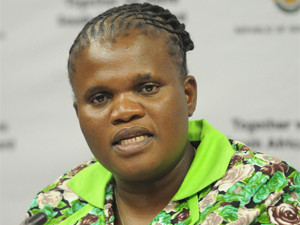
Despite having temporary mechanisms to address the funding shortfall for digital migration campaigns, the Department of Communications (DOC) believes the insufficient funding will hamper its flagship project.
Speaking during her department's budget vote in Parliament, DOC minister Faith Muthambi said slow registration take-up by citizens is not only driven by lack of valid TV licences but by limited public and consumer awareness campaigns.
"...the success of the DTT [digital terrestrial television] project across the globe is heavily dependent on the implementation of a focused and properly funded education and awareness campaign.
"It is with great concern to note the DTT public awareness campaign and related activities, such as the call centre, are not funded for the 2016/17 financial year," she told Parliament.
"However, there are temporary mechanisms in place to address the funding shortfall in the interim."
After missing the International Telecommunication Union's June 2015 deadline for migration, the DOC launched the country's first public awareness campaigns to educate citizens about the need to migrate and the benefits of digital broadcasting last July.
The launch was followed by a series of digital migration 'izimbizo' the minister led across the country.
Against the clock
Ovum analyst Richard Hurst says the entire digital migration process has been beset with delays caused by variety of issues. "The issue concerning a lack of funds for educating citizens may be a valid concern but should not be one of the reasons for yet again delaying the digital migration process."
Government has repeatedly come under fire for not speeding up the country's digital migration process.
The industry has earmarked migration from analogue to digital TV as of prime importance because it will free up spectrum to ensure connectivity of all South African citizens by 2020.
Larger operators like MTN and Vodacom are gunning for spectrum in the 2 600MHz, 800MHz and 700MHz ranges, while 3.5GHz is a spectrum block suitable for smaller players.
Hurst explains: "The DTT process has stifled some facets of the industry; in particular, the mobile network operators and their plans for cheaper, ubiquitous mobile broadband offerings as well as the broadcasters and their ability to supply new content on new platforms. In the end, we can safely say the South African consumer and business have been losing out or at least being forced into an environment of unnecessary scarcity which has its cost limitations."
Snail's pace registrations
Although registration of qualifying TV-owning households for free set-top boxes (STBs) began in October last year, only 14 000 households have registered to receive these devices.
Government plans to provide free STBs to five million poor TV-owning households across the country.
According to the DOC's terms, to qualify for free STBs, applicants must prove they are South African citizens and their household income is R3 200 (or less).
The department decided to prioritise border-lying areas. The Square Kilometre Array in the Northern Cape, as well as Mpumalanga, Free State and the North West were prioritised.
In her budget vote, Muthambi admitted there has been slow registration take-up by citizens due to the TV licence requirement.
The minister stated that with agreement from SABC management, the TV licence requirement for the STB subsidy registration process has now been removed.
"I have also instructed the SABC to clean up the TV licence database to have accurate and reliable information on who owns a TV set in SA to enable proper infrastructure planning."
Digital switch
Earlier this year, the DOC announced the start of dual illumination in the country's digital migration.
Dual illumination, or simulcast, is the interim period in which both analogue and digital signals are allowed to be transmitted at the same time before the analogue signal is switched-off. At the end of the dual illumination period, all analogue television broadcasts will cease, according to the DOC.
"To make digital migration a success, we will work with the Department of Telecommunications and Postal Services and National Treasury to come up with a mechanism on how Sentech can be assisted to maintain two network systems (dual illumination) costs," Muthambi told Parliament.
"We will announce the analogue signal switch-off date when more than 80% of the TV-owning households have been migrated to digital TV."
Share